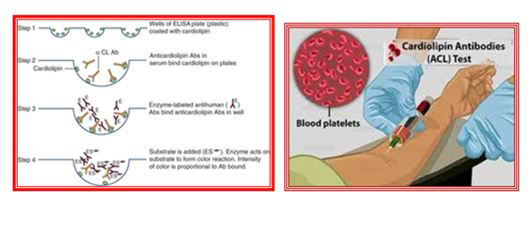ANTI-CARDIOLIPIN ANTIBODY IgM:
Why Anti-Cardiolipin Antibody (ACA) test?
CLINICAL INFORMATION :
ANTI-CARDIOLIPIN ANTIBODY (ACA)-IgM antibody test helps in the screening of anti-phospholipid syndrome (APS). APS is an autoimmune disorder that produces anti-cardiolipin antibodies. Since cardiolipin plays a role in anti-coagulant function (clotting), these auto-antibodies interfere with the clotting process and result in inappropriate or excess clotting. High levels of anti-cardiolipin antibodies are seen often in abnormal blood clotting, autoimmune diseases like systemic lupus erythematosis (SLE), or repeated miscarriages in certain pregnancies etc. other functions of cardiolipin apart from anticoagulant, electron transport energy metabolism and apoptosis are cholesterol translocation from outer to inner mitochondrial membrane, activates mitochondrial cholesterol side-chain cleavage, import protein into mitochondrial matrix, modulates alpha-synuclein (a malfunction of this process is thought to be a cause of Parkinson’s disease) Absence or abnormally low cardiolipin levels are associated with certain conditions like Barth syndrome, Parkinson’s and Alzheimer’s disease, Non-alcoholic fatty liver, heart failure, Tangier disease, diabetes, syphilis, HIV, cancer, anti-phospholipid syndrome, other additional anti-cardiolipin diseases like Bartonella infection, chronic fatigue syndrome etc. cardiolipin is a complex lipid also called as diphospholipid-glycerol lipid (these two phosphates can trap one proton each, helps in the process of oxidative phosphorylation), which consists of PG molecules attached to a phosphatidic acid (PA) molecule. Phospholipid- cardiolipid is the signature lipid of the mitochondrial membrane. It is present in the outer membrane and also more in the inner membranes of mitochondria. It plays an important role in regulating various kinds of mitochondrial proteins (mitochondria energy metabolism) such as respiratory chain complexes and mitochondrial substrate carriers, i.e. electron transport complexes, carrier proteins, phosphate kinases, essential for the organization of some mitochondrial structures like cristae and contact sites. Cardiolipin also has an important role in apoptosis. The cardiolipin distribution in the outer mitochondrial membrane would lead to apoptosis of the cells as it triggers cardiolipin-specific oxygenase which produces cardiolipin hydro peroxidase which results in a confirmatory change in this lipid structure to stimulate cytochrome-c (cyt-c) release initiates the cascade of apoptotic factors. This cyt-c, in turn, binds to IP3 in the endoplasmic reticulum to stimulate calcium release. When these calcium levels reach toxic levels, causes cell death. Symptoms of the antiphospholipid-cardiolipin syndrome are blood clots in legs, lungs (pulmonary embolism), kidneys (ischemia), and brain, deep vein thrombosis (DVT) i.e. blood clots in legs, in pregnant women repeated stillbirths and miscarriages, stroke, transient ischemic attack, rashes (patches of small red spots or net-like pattern), cardiovascular disease (damage to heart valves), bleeding gums, nose, and neurological symptoms – when blood clots block the blood flow to different parts of the brain (chronic headaches, migraines, dementia, and seizures). Risk factors are infertility, immune system disorders, infections, medications, surgery, cigarette smoking, pregnancy, oral contraceptives in menopause, high TG and cholesterol levels, and family history. Complications of the untreated anti-phospholipid-cardiolipin syndrome are kidney failure, stroke (partial paralysis and loss of speech), cardiovascular problems, lung problems (pulmonary embolism) and pregnancy complications, etc.

General instructions:
Sample Requirement: Specimen - Blood sample collected from the vein. Test Preparation: None.
NOTE - Sample for specimen collections may vary based on the patient’s condition/cases according to the patient’s presentingcomplaints / signs or symptoms:
SPECIMENREQUIREMENT (Special or Rare Cases) - As instructed and guided by Physician / Clinician / Pathologist / as per Laboratory’s requirements, according to procedures and protocols.
This Multi-Specialty Clinical Referral Laboratory RTDIAGNOSTICS provides precise and accurate tests with an extensive range of testing services to the medical centers to help in the diagnosis and identification of pathology in the test specimens for infectious diseases and also to evaluate the function of organ systems of the patient. It prevents further complications and helps to stabilize and restore health to near normalcy at the earliest without delay.



